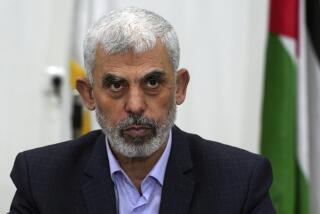Sharon Challenges Shamir at Critical Time for Party : Israel: Action complicates the prime minister’s moves. A contest of the ‘right wing against itself’ is foreseen.
- Share via
JERUSALEM — Ariel Sharon, whose aggressive campaign to build Jewish settlements has changed not only the landscape in the West Bank and Gaza Strip but also the texture of Israel’s relations with the United States, is challenging Prime Minister Yitzhak Shamir for leadership of the ruling Likud Party for the next elections, government radio said Thursday.
Sharon made the announcement, a repeat of a threat he voiced months ago, at a Thursday appearance before high school students. Sharon told the students that he would crush the Arab uprising and continue to hold peace talks but ensure that Israel gave up none of the occupied land.
His challenge complicates Shamir’s own effort to portray himself as both promoter of peace talks and protector of Israel’s claim to the land. Not only does Shamir face skepticism from normally allied parties on the right but also from within his own Likud.
“The 1992 election in Israel is going to be a contest of the right wing against itself,” predicted columnist Hirsh Goodman.
Sharon is by far Israel’s most controversial and unpredictable politician. He led Israel into the 1982 invasion of Lebanon when he was defense minister in Menachem Begin’s government.
While holding seemingly obscure posts, including his present office as housing minister, Sharon has dedicated whatever resources at hand to developing the West Bank and Gaza on behalf of Israeli settlers. His aim is to preclude any solution to the Israeli-Palestinian conflict that involves surrender of the territory to Palestinian control. The land-for-peace policy is President Bush’s favored formula for resolving the long, bitter dispute.
Since forging a right-wing coalition that has ruled Israel since 1990, Shamir’s official policy in the West Bank and Gaza Strip has been to expand settlements. Sharon, overspending his budget and putting up houses in places tenants have yet to discover, has pushed the policy faster than any Israeli leader has in the 25-year occupation of the territories.
Bush, whose Administration often has spoken against the program, is pondering whether to condition support for Israeli loan needs on a halt to the settlement effort. Sharon said Thursday there should be no link between settlements and the loan guarantees, which Israel wants to provide jobs for a flood of new immigrants from the former Soviet Union.
Spending on the settlements has raised a question of Israeli priorities. If it has money to put into the West Bank and Gaza, why does it need special help to make international loans cheaper and easier to get?
In any event, Sharon evidently feels that Shamir is vulnerable among Likud faithful who favor keeping the land. Sharon, along with not a few Likudniks, consider Middle East peace proposals on self-rule for Palestinians as undermining Israel’s control. “Shamir is caught between his love for (greater Israel) and his being entrapped in a peace process he would rather avoid,” said Goodman.
No date for elections has been set, even though Shamir’s government has lost its majority support in Parliament. The Likud-led minority government remains in power while opponents wrangle over whether to oust it or cooperate with it on a date for elections.
The Labor Party, the largest opposition group, is also locked in a power struggle. Longtime rivals Shimon Peres and Yitzhak Rabin are expected to run against each other in primaries this spring. The Likud battle will take place at a party convention.
Sharon would prefer that Shamir hang onto power until November, the end of Shamir’s four-year term. He warned that Shamir’s record in office was not good enough to withstand an early vote.
“How are you going to explain the failure to curb the (Palestinian uprising) and protect the settlers? How are you going to explain away the terrible unemployment figures?” Sharon asked Shamir during a recent party meeting.
Sharon is a favorite of nationalist settlers he has showered with resources to expand their communities. The settlers have been upset by a wave of ambushes carried out by Palestinian gunmen in the West Bank and Gaza. They also oppose the peace talks.
Meantime on Thursday, an army panel reversed an expulsion order against one of 12 Palestinians accused of inciting violence. It was the second time since 1967 that such an order has been reversed.
The panel ruled that military commanders have “other measures” to keep the accused agitator, university student Eyad Joudeh, under control. Joudeh has been jailed without trial.
Seven of the other deportees are appealing their banishment to the Israeli Supreme Court. The army panel ruled that the remaining four are liable for expulsion, though they, too, may appeal.
Profile: Ariel Sharon
Sharon is Israel’s most controversial and unpredictable politician. While holding seemingly obscure posts, including his present one as housing minister, he has dedicated resources to developing the West Bank and Gaza Strip on behalf of Israeli settlers. His aim is to preclude any solution to the Palestinian conflict that involves surrender of the territory. Born: 1928, Kefar Malal, Palestine (now in Israel) Education: Studied military theory at Staff College, Camberley, England; law degree from Tel Aviv University, 1966 Career highlights: Joined Jewish forces protecting kibbutzim as youth; led crack unit during 1948 war of independence and was hero of 1956 Suez war; became major general just before outbreak of 1967 war; quit army in 1973, was recalled when war with Egypt erupted later that year; helped form Likud Party, 1973; served in Parliament, as minister of agriculture, defense, engineering 1982 invasion of Lebanon; currently minister of construction and housing Family: Married, two sons
More to Read
Sign up for Essential California
The most important California stories and recommendations in your inbox every morning.
You may occasionally receive promotional content from the Los Angeles Times.













